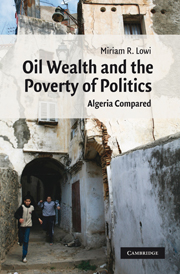Book contents
- Frontmatter
- Contents
- List of tables
- List of figures
- Preface
- Map of Algeria
- Part I Introduction
- Part II Algeria and its discontents
- 3 From conquest to independence
- 4 The elaboration of a system
- 5 From boom to bust, and … verging on breakdown
- 6 The persistence of violence and the process of re-equilibration
- Part III Comparisons and conclusions
- 8 Conclusions: oil wealth and the poverty of politics
- Bibliography
- Index
- CAMBRIDGE MIDDLE EAST STUDIES 32
6 - The persistence of violence and the process of re-equilibration
Published online by Cambridge University Press: 29 March 2010
- Frontmatter
- Contents
- List of tables
- List of figures
- Preface
- Map of Algeria
- Part I Introduction
- Part II Algeria and its discontents
- 3 From conquest to independence
- 4 The elaboration of a system
- 5 From boom to bust, and … verging on breakdown
- 6 The persistence of violence and the process of re-equilibration
- Part III Comparisons and conclusions
- 8 Conclusions: oil wealth and the poverty of politics
- Bibliography
- Index
- CAMBRIDGE MIDDLE EAST STUDIES 32
Summary
In the ten years of civil war that followed the military coup, more than 100,000 Algerians died and several thousand remain unaccounted for. During this period, there were four different presidents and eight prime ministers. An International Monetary Fund (IMF)-backed structural adjustment program, furthering efforts at economic liberalization, was also implemented.
In its early stages, the violence pitted the state against members and supporters of the FIS, and then an array of Islamist groups. It went through at least three different phases. In the first phase (1992–4), the violence took the form of urban civil war, characterized by targetted killings by insurgents and fierce repression of Islamists in and around Algiers. The second phase (1994–8) witnessed the collapse of the state's monopoly over violence and its almost total loss of control over the domestic political economy; this combined with the “privatization” of violence in the hands of not only Islamist insurgents, but government-backed militia forces as well. Mass terror, generalized insecurity, and a high death toll characterized this period.
Writing in the winter of 1995, Hugh Roberts, one of the more astute analysts of Algerian affairs, described the situation thus:
The Algerian state is weaker than at any moment in its history since 1962. It has lost such legitimacy as the old one-party system procured for it until 1988 … [i]t is still unable to offer most of its citizens the prospect of substantial relief from economic distress, and cannot even guarantee elementary security for their lives and property, since the Algerian army has clearly long since lost its monopoly of the use of physical force and has been failing quite spectacularly in its elementary duty of restoring order.[…]
- Type
- Chapter
- Information
- Oil Wealth and the Poverty of PoliticsAlgeria Compared, pp. 126 - 144Publisher: Cambridge University PressPrint publication year: 2009



